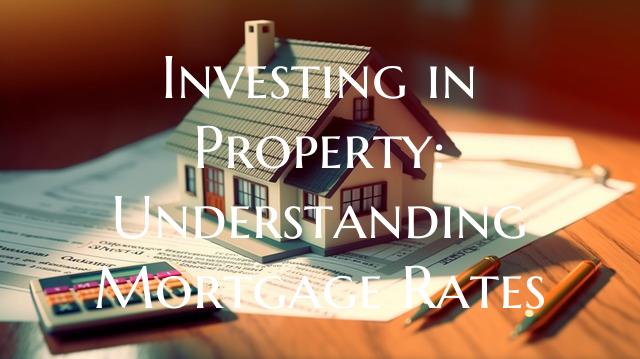Investing in Property: Understanding Mortgage Rates

Investing in Property: Understanding Mortgage Rates
Investing in property can be a lucrative endeavor, but understanding mortgage rates is crucial for making informed decisions. Mortgage rates play a significant role in the total cost of financing a property purchase, impacting the monthly payments and the overall affordability of the investment. To ensure success in your property investment journey, here is a comprehensive guide to understanding mortgage rates.
What Are Mortgage Rates? Mortgage rates refer to the interest charged by lenders on a home loan. These rates are determined by various factors, including the current economic conditions, the borrower's financial profile, the loan amount, and the term of the loan. Mortgage rates are typically expressed as an annual percentage rate (APR) and can be fixed or adjustable.
Fixed vs. Adjustable Rates Fixed-rate mortgages have a stable interest rate throughout the loan term, providing predictability and consistency in monthly payments. On the other hand, adjustable-rate mortgages (ARMs) have interest rates that can fluctuate over time based on market conditions. While ARMs often start with lower rates, they can increase significantly in the future, leading to higher payments.
Factors Influencing Mortgage Rates Several factors influence mortgage rates, including: 1. Economic Indicators: Mortgage rates are closely tied to economic factors such as inflation, employment trends, and the overall health of the economy. 2. Federal Reserve Policies: The Federal Reserve's monetary policies, including changes to the federal funds rate, can impact mortgage rates. 3. Borrower's Credit Profile: Lenders consider the borrower's credit score, income, and debt-to-income ratio when determining the mortgage rate. 4. Loan Amount and Term: The loan amount and term can also affect the interest rate, with longer-term loans typically having higher rates.
Tips for Getting the Best Mortgage Rate To secure the best mortgage rate for your property investment, consider the following tips: 1. Improve Your Credit Score: A higher credit score can help you qualify for lower interest rates. 2. Shop Around: Compare rates from multiple lenders to find the most competitive offer. 3. Consider Points: Paying points upfront can lower your interest rate, but it's essential to calculate whether the cost is worth the savings. 4. Lock in the Rate: Once you find a favorable rate, consider locking it in to protect against future rate increases.
In conclusion, understanding mortgage rates is essential for successful property investment. By familiarizing yourself with how rates are determined, the types of mortgages available, and strategies for securing the best rate, you can make informed decisions that benefit your financial goals. Whether you're a first-time homebuyer or a seasoned investor, navigating mortgage rates effectively is key to maximizing the returns on your property investments.
